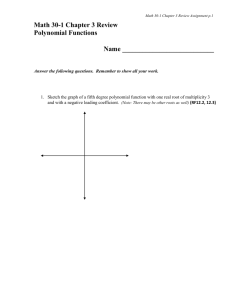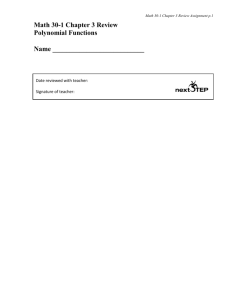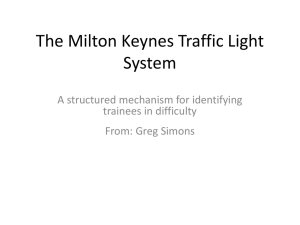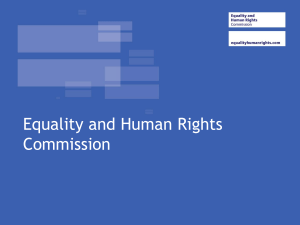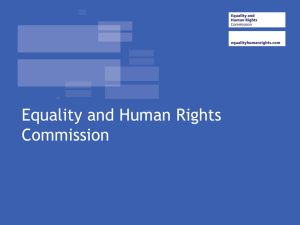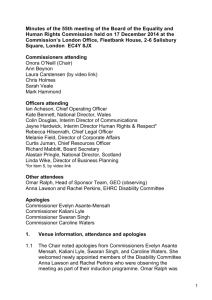EHRC Regulatory Decision-Making Panel Terms of Reference
advertisement
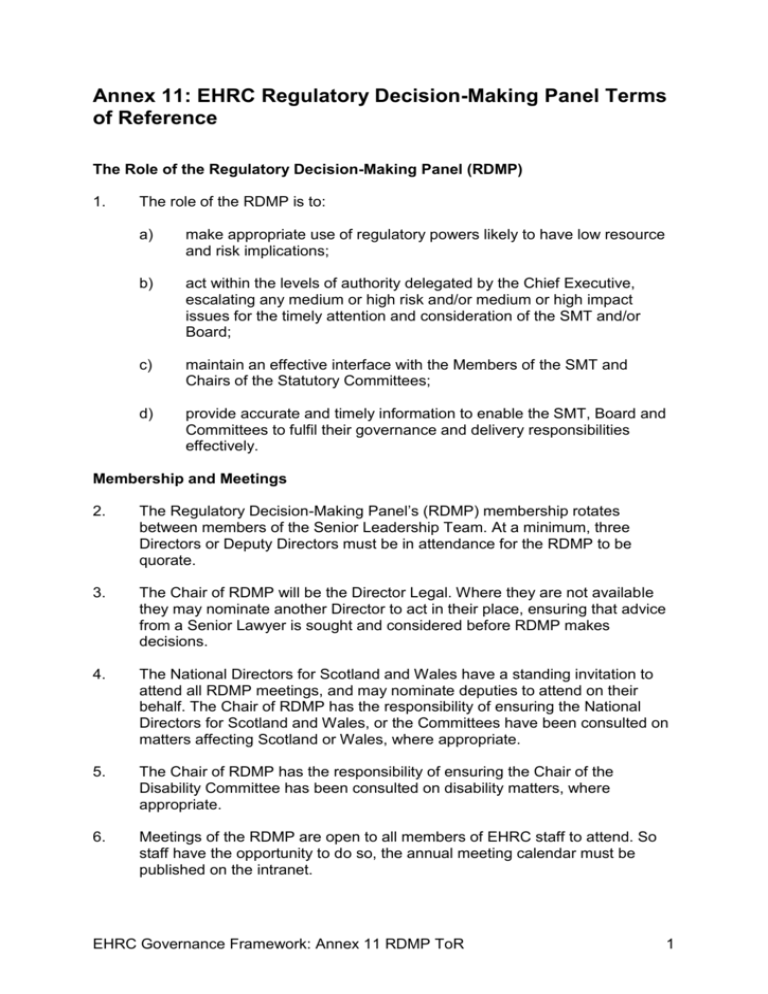
Annex 11: EHRC Regulatory Decision-Making Panel Terms of Reference The Role of the Regulatory Decision-Making Panel (RDMP) 1. The role of the RDMP is to: a) make appropriate use of regulatory powers likely to have low resource and risk implications; b) act within the levels of authority delegated by the Chief Executive, escalating any medium or high risk and/or medium or high impact issues for the timely attention and consideration of the SMT and/or Board; c) maintain an effective interface with the Members of the SMT and Chairs of the Statutory Committees; d) provide accurate and timely information to enable the SMT, Board and Committees to fulfil their governance and delivery responsibilities effectively. Membership and Meetings 2. The Regulatory Decision-Making Panel’s (RDMP) membership rotates between members of the Senior Leadership Team. At a minimum, three Directors or Deputy Directors must be in attendance for the RDMP to be quorate. 3. The Chair of RDMP will be the Director Legal. Where they are not available they may nominate another Director to act in their place, ensuring that advice from a Senior Lawyer is sought and considered before RDMP makes decisions. 4. The National Directors for Scotland and Wales have a standing invitation to attend all RDMP meetings, and may nominate deputies to attend on their behalf. The Chair of RDMP has the responsibility of ensuring the National Directors for Scotland and Wales, or the Committees have been consulted on matters affecting Scotland or Wales, where appropriate. 5. The Chair of RDMP has the responsibility of ensuring the Chair of the Disability Committee has been consulted on disability matters, where appropriate. 6. Meetings of the RDMP are open to all members of EHRC staff to attend. So staff have the opportunity to do so, the annual meeting calendar must be published on the intranet. EHRC Governance Framework: Annex 11 RDMP ToR 1 Powers delegated to RDMP 7. The Chief Executive has delegated the following matters to the RDMP: a) making appropriate use of regulatory powers likely to have low resource and low risk implications; b) implementing the Strategic Plan, Corporate Plan, litigation strategy and other strategic policies relating to the discharge of the EHRC’s statutory functions, taking into account the advice of relevant officers; c) allocating work to available staff with the appropriate skills, expertise and behaviours, taking into account the advice of the Deputy Director People; d) allocating available budget, taking into account the advice of the Deputy Director Finance; e) implementing the strategy and procedures for management of risk. f) ensuring decisions are taken in line with: - Strategic and Corporate Plan objectives and key performance indicators; - The EHRC’s equality objectives under the public sector equality duty; - Any other targets set by the SMT or Board, including for the use of financial resources. Chief Executive’s Reservations 8. 9. The Chief Executive reserves the right to make decisions on litigation that falls within the delegated authority to RDMP, if appropriate, in relation to: a) Approving the budget in relation to decisions relating to applications for legal assistance under section 28 of the Equality Act 2006. This includes applications for assistance, requests for additional funding for an ongoing case, and whether or not to continue a case. b) Proposals to intervene and own name litigation under section 30 of the Equality Act 2006. This includes thee request for additional funding for an ongoing intervention, and whether or not to continue an intervention. So that the Chief Executive has proper opportunity to exercise these reserved power, RDMP minutes and relevant papers should be shared with the Chief Executive no later than 48 hours after the meeting, where possible. EHRC Governance Framework: Annex 11 RDMP ToR 2 Chair’s Action 10. Where it is not expedient to wait for the next RDMP meeting for a decision, the Chair of RDMP, in consultation with the Chief Executive where appropriate, may take a decision on any matter within RDMP’s delegated authority. 11. Any decisions agreed by Chair’s Action must be reported to the next RDMP meeting, and recorded in the minutes; and all papers relating to decisions agreed by Chair’s Action must be published on the intranet. Papers and Reporting 12. RDMP will meet at least fortnightly. 13. All papers for consideration by RDMP must be approved by the Chair and circulated by the RDMP Secretariat no later than 48 hours in advance of the meeting, where possible. 14. RDMP minutes must be approved by the Chair of RDMP and shared with the Chief Executive no later than 48 hours after the meeting, where possible. 15. All final versions of RDMP documents and minutes must be published on the EHRC’s intranet within 7 days of the meeting, where possible. 16. Once an intervention has been approved by the RDMP, its deliverables must be incorporated into the relevant officer’s Delivery Reports and progress against them reported to the Delivery Board, SMT, Board and Committees, as appropriate. 17. Once an intervention has been approved by the RDMP, the responsible Director has the authority to approve up to a further 20% resource allocation, where necessary and available. If resource requirements exceed a further 20%, the responsible Director must revert to the RDMP for consideration, consulting the Chief Executive, as appropriate. 18. Where RDMP agrees that no further action should be taken in relation to a proposal, the relevant officer must provide the RDMP Secretariat with a copy of their correspondence with the stakeholder who requested the action within 7 days of the RDMP meeting, where possible. 19. Where the decision for no further action relates to a legal case, an alert must be sent to the EHRC’s legal distribution list to provide others with the opportunity to intervene if they wish to do so. 20. Monitoring information about the use of the EHRC’s powers must be shared with the Director of Research on a fortnightly basis. The Director of Research must share this information with the Delivery Board, SMT and Statutory Committees through the quarterly Watching Briefs. EHRC Governance Framework: Annex 11 RDMP ToR 3 Code of Conduct and Conflict of Interest 21. In line with Section 5 of the EHRC’s Governance Framework, members of RDMP must observe the Code of Conduct whenever they conduct the business, or act as a representative of the EHRC; and must abide by the Nolan Principles of Standards in Public Life; and the Six Principles of Good Governance. 22. Members of RDMP should abide by Section 5 of the EHRC’s Governance Framework and its guidance for identifying, registering and managing conflicts of interest. The Chief Legal Officer is there to provide advice and assistance and to discuss fully how a Member of RDMP’s interests might be perceived by others. EHRC Governance Framework: Annex 11 RDMP ToR 4
